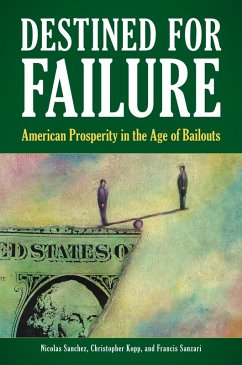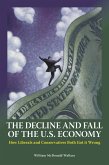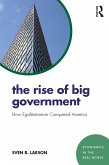This book provides a historical background of the American business cycle, challenges the validity of conventional Keynesian ideology, and presents a bold, alternative theory of how production leads to wealth in our modern economy.
The United States is mired in the aftermath of booming economic prosperity, resembling the trouble recently experienced by the Japanese economy due partially to similar Keynesian bailouts and subsidies. Now more than two years into the current financial crisis, Americans are starting to wonder if we can ever escape the consequences of past mistakes. If our "recovery" plan continues along the previous paths that generated economic bubbles and unemployment, then we are destined for failure.
Destined for Failure: American Prosperity in the Age of Bailouts provides a conceptual framework previously available only to those with formal university training. It explains the effects of government regulation, political interference in the housing and job markets, misallocation of resources in health and education, moral hazard, environmental constraints, and excessive taxation. The authors provide insight into their view of Keynesian economics as an outdated, detrimental ideology, and take the Bush and Obama administrations to task for budget deficits and cronyistic subsidies and bailouts.
Hinweis: Dieser Artikel kann nur an eine deutsche Lieferadresse ausgeliefert werden.
The United States is mired in the aftermath of booming economic prosperity, resembling the trouble recently experienced by the Japanese economy due partially to similar Keynesian bailouts and subsidies. Now more than two years into the current financial crisis, Americans are starting to wonder if we can ever escape the consequences of past mistakes. If our "recovery" plan continues along the previous paths that generated economic bubbles and unemployment, then we are destined for failure.
Destined for Failure: American Prosperity in the Age of Bailouts provides a conceptual framework previously available only to those with formal university training. It explains the effects of government regulation, political interference in the housing and job markets, misallocation of resources in health and education, moral hazard, environmental constraints, and excessive taxation. The authors provide insight into their view of Keynesian economics as an outdated, detrimental ideology, and take the Bush and Obama administrations to task for budget deficits and cronyistic subsidies and bailouts.
Hinweis: Dieser Artikel kann nur an eine deutsche Lieferadresse ausgeliefert werden.









